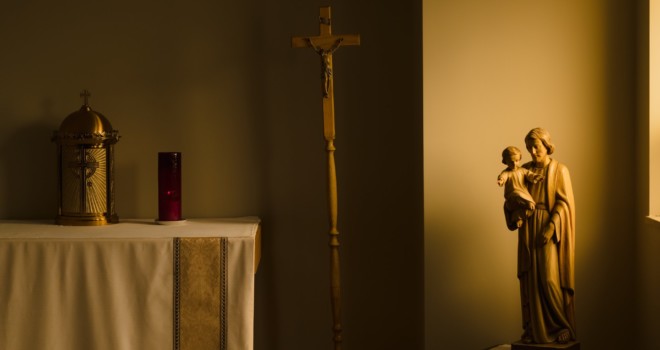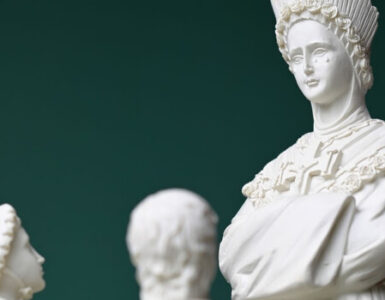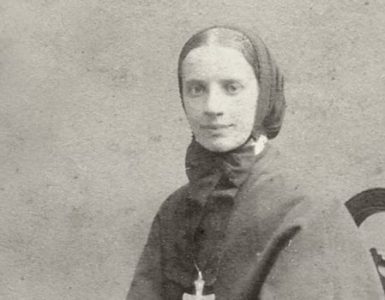Father’s Day was yesterday and the thought of it gave me a sinking feeling in my stomach. As I have mentioned before, I am currently working through grief and trauma therapy related to the pervasive emotional abuse that I endured from my parents. I know that my experience is not unique—many people experience some form of emotional abuse from their parents.
What makes emotional abuse particularly damaging is that it is often given under the guise of “love.” It isn’t until years later (if ever) that a child may come to realize that love does not attempt to control, does not try to manipulate with guilt, and does not use rage and terror in order to force submission. When that form of “love” is all a child knows, it can be confusing to learn that real love is the opposite.
Some of the most painful ramifications from decades of this sort of abuse are the implications on the spiritual life.
A Distortion of Fatherhood
Growing up, I had a close relationship with my dad. I went everywhere with him, and we shared many common interests. He showed me affection and was proud of me and my accomplishments. I thought that I was the center of his world.
That was, at least, the side that everyone saw (and the side that I chose to see). My dad was also someone with narcissistic personality disorder, and possibly other disorders. While sometimes he made me feel safe, other times my fear would make him fly into a rage. As long as I was doing things that made him proud, he was happy—but if I dared to make a decision that he didn’t agree with he would try to get me to change my mind using a combination of spiritual abuse and anger. When he wanted to, he was gentle and affectionate—but that calm could shatter at a moment’s notice, replaced with rage. And although he liked telling me all about himself and his life, I had to struggle to get a word in edgewise. I never knew what would set off his anger, and so I attempted to make him happy and take care of him.
It wasn’t until two years ago that I began to realize that none of these things were indicative of healthy fatherhood. I just assumed that a father was someone you took care of, worked hard to please, accepted criticism from, and absorbed the anger of.
I know that although the particulars may vary, many of you reading this may be able to relate to my story. Many fathers are not healthy fathers, and so many of us grow up with a warped sense of what fatherhood looks like.
Unfortunately, that distorted view of a father’s love makes it harder for us to receive and experience the love of God the Father, a healthy father who truly loves us.
Experiencing a Healthy Father
Almost two years ago, I began working with my current spiritual director—a spiritual father who has walked closely with me in my journey of healing and breaking the cycle of abuse. Through the fatherhood of this dear priest, I’ve begun to see just how unhealthy my own dad was (and is). As a child, I used to tell my dad that he “helped me see the love of God the Father better”. I can see now how wrong I was.
For most of my life, I was afraid of God the Father. I was convinced that he was watching closely for me to make a mistake, that his wrath was inevitable, and that I needed to work hard to please him…because that was what my dad was like.
Then, I met the priest who has become a spiritual father to me. This father is patient, kind, gentle, generous, forgiving, has healthy boundaries and respects my boundaries, and is happy to hear what is on my mind and heart. He supports me and delights in my vocation to marriage (whereas my biological dad was angry when I decided to get married, presumably because I would then be outside of his control). He helps me face the hard and scary things that God is calling me to (namely the demanding course of therapy needed to heal from the complex PTSD that I have from my parents’ abuse), encouraging me to persevere when I want to give up.
And, in all of this, I have finally begun to realize—this is what healthy fatherhood looks like. It looks very different from the fatherhood I experienced growing up. And if this is what good, healthy fatherhood looks like, then maybe God’s fatherhood actually resembles this brand of paternity.
Looking for the Father
I wish that I could tell you that this experience of healthy fatherhood has healed all of my wounds, and that I now understand perfectly who God the Father is and can trust him.
But this story is still being written.
Recently in my healing, I have come to the realization that no one—not even my very healthy spiritual father—can replace my dad. The pain of my childhood will never be erased, and the gap left by my biological father can never be filled by another man.
It can, however, be filled and healed by the love of the Father. God’s love alone is enough to do that.
Prior to now, I have been looking to the father figures in my life to fill that gap. Inevitably, I am disappointed, and still find myself face to face with my grief. I know that I am not alone in this sort of futile search. My spiritual director was recently encouraging me to turn to God the Father when I wanted a hug from a dad, and I responded, “But…he doesn’t have any arms!” I understand Catholic theology quite well and know that there is nothing lacking in God—in fact, the arms of human fathers are only able to hint at the tremendous love of the Father’s spiritual embrace. But despite that, there is a real ache there—I want a father who can hug me, hang out with me, listen to me, tell me dad jokes, and text me when I’m having a hard day. Not having a dad (or a spiritual father capable of taking my dad’s place) means grieving those hints of the Father’s love that I should have.
But this Father’s Day, I find myself drawn to grieve those losses, ache for an earthly father, accept that no spiritual father or father figure can replace him—and look to God the Father. I am beginning to get glimpses of his Fatherhood, but there is still so much pain and grief. I have a long way to go.
Incidentally, I have the feeling that he has already found me and is drawing me into his fatherly embrace. In the meantime I know that it is okay if I—and if you!—aren’t ready to settle into the Father’s love just yet. He is patient. He is kind. He is willing to wait as long as it takes.
✠
Photo by Josh Applegate on Unsplash












